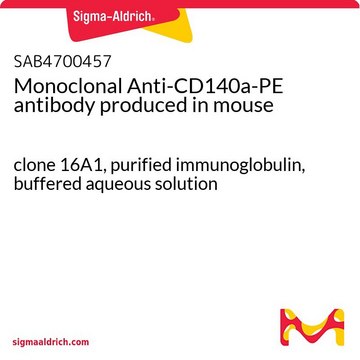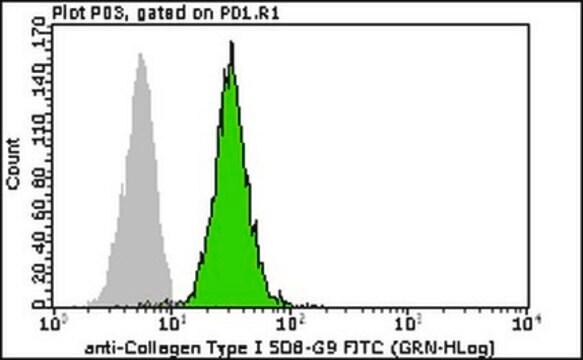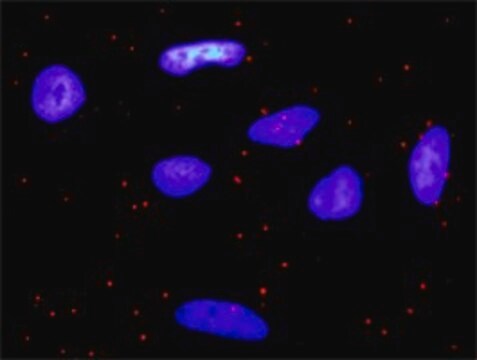SAB4700455
Monoclonal Anti-CD140a-APC antibody produced in mouse
clone 16A1, purified immunoglobulin, buffered aqueous solution
Sinónimos:
Anti-PDGF-RA, Anti-PDGFRA
Iniciar sesiónpara Ver la Fijación de precios por contrato y de la organización
About This Item
UNSPSC Code:
12352203
NACRES:
NA.41
Productos recomendados
biological source
mouse
Quality Level
conjugate
Allophycocyanin conjugate
antibody form
purified immunoglobulin
antibody product type
primary antibodies
clone
16A1, monoclonal
form
buffered aqueous solution
species reactivity
human
technique(s)
flow cytometry: suitable
isotype
IgG1
NCBI accession no.
UniProt accession no.
shipped in
wet ice
storage temp.
2-8°C
target post-translational modification
unmodified
Gene Information
human ... PDGFRA(5156)
General description
Cluster of differentiation 140a (CD140a), also known as platelet-derived growth factor receptor α(PDGFRA), is encoded by the gene mapped to human chromosome 4q12. The encoded protein belongs to the receptor tyrosine kinase gene family.
The mouse monoclonal antibody 16A1 recognizes CD140a / PDGF-RA, the 170 kDa alpha chain of platelet-derived growth factor receptor, which is widely expressed on a variety of mesenchymal-derived cells and plays pro-proliferative or anti-proliferative roles in various tumours.
Immunogen
CD140a-transfected NIH 3T3 cells
Application
The reagent is designed for Flow Cytometry analysis of human blood cells using 10 μL reagent / 100 μL of whole blood or 1e6 cells in a suspension. The content of a vial (0.25 mL) is sufficient for 25 tests.
Biochem/physiol Actions
Platelet-derived growth factor receptor plays a vital role in the development and maturation of platelets. Cluster of differentiation 140a (CD140a)/ PDGFRA acts as a potential target of for imatinib, a revolutionary drug for the treatment of chronic myeloid leukemia. PDGFRA pathway might be involved in developmental process of thrombocytes. The encoded protein facilitates hepatic stellate cell (HSCs) proliferation and migration. Mutation in the gene has been observed in gastrointestinal stromal tumors (GISTs).
Features and Benefits
Evaluate our antibodies with complete peace of mind. If the antibody does not perform in your application, we will issue a full credit or replacement antibody. Learn more.
Physical form
Solution in phosphate buffered saline containing 15 mM sodium azide and 0.2% high-grade protease free BSA as a stabilizing agent.
Disclaimer
Unless otherwise stated in our catalog or other company documentation accompanying the product(s), our products are intended for research use only and are not to be used for any other purpose, which includes but is not limited to, unauthorized commercial uses, in vitro diagnostic uses, ex vivo or in vivo therapeutic uses or any type of consumption or application to humans or animals.
¿No encuentra el producto adecuado?
Pruebe nuestro Herramienta de selección de productos.
Storage Class
10 - Combustible liquids
wgk_germany
WGK 2
flash_point_f
Not applicable
flash_point_c
Not applicable
Elija entre una de las versiones más recientes:
¿Ya tiene este producto?
Encuentre la documentación para los productos que ha comprado recientemente en la Biblioteca de documentos.
PDGFRA mutations in gastrointestinal stromal tumors: frequency, spectrum and in vitro sensitivity to imatinib.
Corless CL, et al.
Journal of Clinical Oncology, 23, 5357-5364 (2005)
PDGFRα promoter polymorphisms and expression patterns influence risk of development of imatinib-induced thrombocytopenia in chronic myeloid leukemia: A study from India
Guru SA, et al.
Tumour Biology : the Journal of the International Society For Oncodevelopmental Biology and Medicine, 39 (2017)
Platelet-Derived Growth Factor Receptor α Contributes to Human Hepatic Stellate Cell Proliferation and Migration.
Kikuchi A, et al.
The American Journal of Pathology, 187 (2017)
A 1.8-Mb YAC contig spanning three members of the receptor tyrosine kinase gene family (Pdgfra, Kit, and Flk1) on mouse chromosome 5
Brunkow ME, et al.
Genomics, 25 (1995)
Overexpressed Skp2 within 5p amplification detected by array-based comparative genomic hybridization is associated with poor prognosis of glioblastomas.
Saigusa K, et al.
Cancer Science, 96, 676-676 (2005)
Global Trade Item Number
| Número de referencia del producto (SKU) | GTIN |
|---|---|
| SAB4700455-100TST | 4061838165817 |
Nuestro equipo de científicos tiene experiencia en todas las áreas de investigación: Ciencias de la vida, Ciencia de los materiales, Síntesis química, Cromatografía, Analítica y muchas otras.
Póngase en contacto con el Servicio técnico








